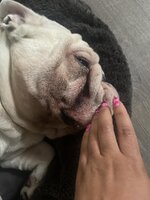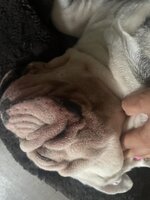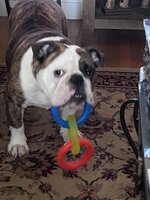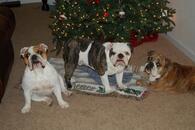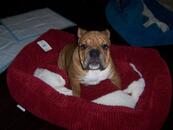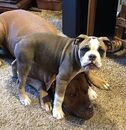Does your bulldog constantly itch?
Get skin irritations?
Stink even right after a bath?
Lick their paws constantly?
Have reoccurring ear infections?
Get hot spots?
If you answered yes to any one of these questions,
then your bulldog could be suffering from Allergies.
What are some of the symptoms of allergies?
•Hot Spots, also called "Moist Dermatitis" (flaming red bouts of skin with moist puss coming out)
•Hives & Bumps
•Constantly Itching (that is not flea related)
•Swollen and Watering Eyes (so much that they never stop)
•Chronic Ear Infections
•Constant Paw Licking
•Butt Twirling or Scooting (They are trying to reach an itch, this can also be anal glands needing to be expressed)
•Face Rubbing on Furniture/Carpeting
•Constantly Stinks, Baths Don't Help Much (this can also be yeast infection)
•Interdigital Cysts Between Toes
•Swollen, Puffy, Red, Bloodshot Eyes
•Chronic Wrinkle Inflammation
•Abundance of Yeast Growth
There are many different allergy sources. Allergens are quite literally EVERYWHERE. Here are some different allergy types so you can start approaching this with an open mind.
ENVIRONMENTAL
The most common allergies that effect most of us, humans and canines alike, are environmental. The dust mites blowing out of your AC vent. The flowers in bloom outdoors. Freshly cut grass. Many of these allergens are literally floating in the air we breathe. There is no escaping these allergens, only surviving them. Daily allergy medication will help combat these allergies. You can take steps to keep your home as dust and allergen free as possible with vacuuming, changing out your air filters, dust mite/bed bug covers, etc.
FOOD ALLERGIES
With all the bad ingredients found in many low grade pet foods, our pets are reacting not only to what it is in these foods but where they get their ingredients sourced from. Many times, a high quality diet can cure almost all of your bullies allergy problems. However, many times a limited ingredient diet, raw or home cooked, may become necessary. These diets can help identify food allergies much faster because you only have a certain number of ingredients to look at. For many bulldog owners, finding the right food has changed their lives for the better. I cannot stress the importance of "Finding the right food" for your Bulldog. Even those Bulldogs with severe allergy problems have found so much relief in a high quality, immune boosting diet. We will discuss the importance of diet further in this article so please continue reading.
CONTACT ALLERGIES
While most allergies are usually divided into just two groups, I decided that Contact Allergies should be in a whole category of its own. While contact allergies are environmental, these actually come into contact with the skin so they can be avoided unlike other environmental allergies that cannot be avoided. Contact allergies are EVERYWHERE! Grass, bushes, blankets, bowls, beds, and even their crate and can be just about anything. If your Bulldog has a sudden outbreak of the itchies or hives, look around. Have they come into contact with something new?
Let me give you some examples to open your mind to the possibilities:
•Have you recently cleaned your floors with a new cleaner?
•Have you bought any new toys?
•Did you change your laundry detergent/fabric softener?
•Did you buy a new floor rug?
•Have you had your carpets cleaned?
•Have you used any topical flea treatments?
Notice the word "New" pops up all the time.
Things you can do to eliminate contact allergies:
•Use detergents free of perfumes and dyes to wash bedding.
•Use only stainless steel or ceramic bowls for eating and drinking, and clean them often.
•Avoid using cleaners at full strength in areas your Bulldog will be laying in often.
•Put clothing on your Bulldog when going into areas they are allergic to, such as grass.
•Wipe down paws when coming inside.
TREATMENT
There are many different ways to treat allergies; it is important to go over the many different treatment options with your Vet. Don't let them give you a package of pills and send you on your way. This only guarantees your Bulldog another vet visit next month, is only temporary relief, and just masks the source of the problem which will likely just return.
If your Bulldog has been itching nonstop and you are finding hives, open sores and/or hair loss, you will likely need a trip to the vet. Many times the constant itching can cause skin infections that will need to be treated with antibiotics.
Some of the treatment options you can discuss with your vet are:
•Steroids - Steroids should only be used as a temporary relief. Many vets may call this an "Allergy Shot." Beware of this terminology because knowing what is in this miracle shot is important. Make sure you ask! Long term usage of steroid pills in smaller doses is not completely uncommon, but you should discuss the risks of using this type of treatment.
•Antibiotics - Antibiotics are one of the number one things prescribed to you by your vet. Antibiotics are wonderful, but most kill broad spectrum bacteria which means they also kill the GOOD bacteria, as well as the BAD bacteria in the body. It is important to give Probiotics when giving antibiotics to help replenish the good bacteria. A spoonful of plain yogurt in each meal is a great way to give daily probiotics.
•Allergy Testing - There are different allergy tests out there, and many vets don't really seem to want to do these tests because they are not 100% accurate and can produce false positives and negatives. Depending on the type of test will depend on the accuracy. In my personal opinion, it is better to know something than to know nothing at all. Keep in mind that some of your test results may not be perfect, at least it will give you an idea of the allergens that are clearly effecting your pet. There is usually a scale that comes with the testing, saying which are 'borderline' and which are 'severe.'
It is also important to know that if you get allergy testing done before they are over 1 year old, you really should get another test done after one year. It takes a full year of life to develop antibodies that fight allergens, and their bodies must be exposed to different allergens of all the four seasons.
The blood test is the least expensive test but also the least accurate. But as I stated previously, I think it is worth every penny if you are fighting severe allergies, even if they are not 100%, being armed with some knowledge is better than none at all.
•Allergy Shots - Allergy shots can be specially produced according to what your allergy test above reveals. You are trying to build up an immunity to what they are allergic to specifically, but this is a slow process and you may not see any results for a full year. This is no miracle cure, but it is worth the time and effort for the possibility of some relief.
•Cyclosporine/Atopica - Cyclosporine should be a last ditch effort to allergy treatments. There are many noted side effects, but this has also been the 'wonder drug' for many pets with severe allergies.
•Natural Remedies - There are many natural remedy choices for helping with allergies. These are not as broadly used because Veterinarians don't sell or market them. One that was discussed recently on our forum is worth trying, it's called "Yucca Intensive." Yucca Intensive is an outstanding, safe, all-natural supplement that is given for a number of reasons, including the joints, skin, and digestion. Yucca is a purified extract derived from the Yucca plant, which is thought to promote symptom relief similar to steroid medications with none of the side effects.
•NuVet Plus Supplement - Nuvet has pages and pages of testimonials regarding how it has saved their pet from a lifetime of allergy problems, tear stains, lethargy, itching, ect. NuVet Plus is an immune system booster and will help not only with allergies but many other health problems. CLICK HERE to order NuVet and give them order code 1101106 to get for 15% off your order with auto-ship! Make sure you tell them bullmama at English Bulldog News sent you!
BEST PART ABOUT NUVET PLUS IS IT IS A 100% MONEY BACK GUARANTEE, so if it doesn't help your pet you can always send it back for a full refund!

•Daily Antihistamine - Besides over the counter Benadryl, there are many other daily allergy medications. Zyrtec, Claritin, Hydroxyzine, and many more. Pets react differently to different antihistamines so you may have to try a few out to find out which works best for your bulldog.
•"Prescription Diet" - In some cases, prescription diets can help. For most Bulldogs however, this should be something you turn and run from in the other direction as fast as you can! These diets are full of bad ingredients and are not good for the long term life of your pet.
There are so many high quality diets and limited ingredient diets out there that are made by good companies with excellent ingredients -- for the same price per pound, if not less. There's also the option of home cooking and/or feeding a raw diet.
WHATEVER YOU CHOOSE TO FEED YOUR PET IS THE MOST IMPORTANT DECISION YOU WILL MAKE REGARDING THEIR LONG TERM HEALTH AND ALLERGY PROBLEMS!
Please do your research on pet foods - we are here to help with this! We have informational articles, dog food ratings, and discussion boards specifically for Diet and Nutrition.
Understanding Dog Food Labels and Finding Bad Ingredients
Frequently Asked Dog Food Questions
Dog Food Ratings
Our Top Recommended Dog Food Choices
View Our Diet and Nutrition Discussion Boards on the Forum
Click to view our Great Products forum with Food Recommendations!
TREATING COMMON ALLERGY FLARE UPS
•YEAST & BACTERIA - Yeast is a Bulldog owner's worst enemy! Many Bulldogs may be diagnosed by a Veterinarian of having allergy problems, when they actually have a yeast infection. Yeast infections are commonly caused by allergies, they seem to go hand-in-hand in most cases, especially in Bulldogs. If yeast makes its way into your pet's ears, wrinkles, tail pocket, vaginal fold, nose ropes, or any other warm cozy and moist areas, it can grow and spread quickly.
So what does yeast look like? Well, that is a difficult answer. Many Bulldog owners may describe it as a dark brown-reddish substance. However, a culture of that "substance" may bring back different forms of bacteria and fungus, as it is not likely that it is only yeast overgrowth. Us Bulldog owners know it looks bad, smells awful, and itches. Unless you get a culture done at your vet you will not know exactly what you are dealing with. This is why it is a good idea to treat and maintain with products that kill both fungus and bacteria.
Yeast or Bacteria Under the Paw Pad
Abnormal Swollen Paw
Inside of ears should not be disgusting and complete fully of gross stuff.
You should have just a little wax and dirt when you clean them.
There are many products you can use to fight these creepy microscopic critters. Keeping all the wrinkles, ears, tail pockets, under paw pads, vulva, etc. clean and dry is very important. Stay on top of the problem. If you are having a problem with these areas, you will need to clean them at LEAST once a day, twice a day is better, until they are completely resolved. Then every few days and maintenance cleanings should only be necessary.
Yeast hates vinegar! Adding a small amount of Apple Cider Vinegar (the kind that is "From the Mother", not the generic kind) to their food or water can help kill yeast. You can also mix 1 cup of vinegar (white vinegar is fine in this case) to bath water after you have rinsed all the soap off. Do a "final rinse" with this water.
Yeast loves warm moist places! Using baby wipes alone to wipe wrinkles will probably make things worse! You are only adding moisture to these areas and making the yeast happy. Baby wipes are great to use first, but you should always follow up with something that will actually kill the bad bacteria and yeast that is left behind. Visit our Recommended English Bulldog Grooming Products forum to see what other Bulldog owners are using.
There are theories that say if you remove potatoes and glutens from the diet then it stops the yeast growth. There are many cases where this theory makes complete sense. However, there is also a lot of information that also negates these theories. It seems more likely, that if removing potatoes from the diet worked, then your Bulldog is actually allergic to potatoes.
If your Bulldog is allergic to beef, for example, and you feed a food that has beef in it, you will lower their immune system, allowing the yeast to attack. All skin, our pets and our own, has good bacteria and bad bacteria. If you eat something you are allergic to, your body lowers its immune system, does not generate enough good bacteria to fight off the bad, and this is when these problems take over. This includes bacterial infections, yeast, mites/mange, hot spots, etc. The most important thing is to remove the offending item from the diet. If you Bulldog is not allergic to potatoes, then they probably will not have a problem with yeast overgrowth. However, you should never choose a diet with a ton of potatoes in it anyway. A good quality kibble should have a limited amount of glutens in it. I myself have several Bulldogs who eat food that have potatoes in it, and I have rarely had any problems with yeast. One of my bulldogs did get a yeast infection, and removing potatoes from her diet did not improve her condition, nor did it prevent a reoccurrence. The only thing that helped was Pharmaseb shampoo with a vinegar rinse and it ended up that her yeast was never diet related. Once cured, there has been no reoccurrence.
When I did my first food change, Molly was covered in yeast. Yeast on her paws, wrinkles, ears....boy did she stink. I thought that was how Bulldogs were supposed to smell. I switched her to a different food and within 3 weeks she was yeast and bacteria free. This had nothing to do with glutens or potatoes, it had everything to do with finding a food with ingredients in it that agreed with her.
Molly Before & After
•HOT SPOTS - Hot Spots are not fun. They are painful and itchy, and they can grow and spread at a rapid rate. If you find a hot spot on your Bulldog, you MUST act as quickly as possible and try to dry it out to keep it from spreading. If you have an electric shaver, shave all the hair off the entire area until you find good skin surrounding the hot spot. The most important thing you will do after this is to wash the hot spot with Hybiclens or an antibacterial soap several times a day. This can take care of the hot spot but remember, Hot Spots itch very badly. Putting a type of self-drying steroid is the best option, so if you have any Malacetic Ultra on hand this works really well. If not, use whatever type of astringent you have on hand, including, Witch Hazel, Douxo, Malacetic Otic, Hydrogen Peroxide or even (yellow) Listerine. If the area is super itchy you may need to give some relief by putting any kind of hydrocortisone cream on it, rub it in really well so it does not keep the area moist! It is important to keep them from licking or itching the hot spot, if you must use a cone or clothing to prevent them from getting to it please do so. Recently, many have started using Vetericyn spray with success when treating Hot Spots.
Hot Spot Prior to Shaving - Fur looks very moist, and skin is red, raised and raw
Hot Spot After Shaved - As you can see the affected area was huge and was spreading
•INTERDIGITAL CYSTS - Interdigital Cysts can be caused by allergies. Paw licking, yeast and bacteria can cause these to generate in between your Bulldog's toes, or "digits." These are believed to be started or caused by an ingrown hair. Interdigital Cysts should be seen by your vet if they don't improve within a couple of days. Soaking the paw in Epsom Salts can bring down the swelling. I have only seen one interdigital cyst on any of my Bulldogs, but from listening to the forum's advice about soaking in Epsom Salt, along with my own decision of applying Malacetic Ultra on it, the cyst was gone in 24 hours. I could not believe it. Panalog would be my next choice to apply on it if the Malacetic did not work. Both of these products reduce swelling, kill bacteria and kill fungus. Panalog is only available by prescription and every Bulldog owner should have panalog in their bully kit!
A very painful looking case of Inter Digital Cysts
•HIVES/BUMPS/SWELLING - For a hive breakout or bumps, give Benadryl, 1mg per pound of body weight, immediately before heading to the vet. This will keep them from continuing to spread and could potentially save your Bulldog's life. If your Bulldog's face starts to swell so can their tongue and neck, eventually choking them to death. Check gums and tongue to make sure they are nice and pink, as well as wet to the touch. They should not feel sticky, this is a sure fire sign of dehydration.
Hives can appear out of nowhere, this happened to Bella just 2 hours after a walk.
PREVENTION
There are things you can do to help prevent allergy flare ups.
•CHOOSE A GOOD SHAMPOO - There are so many shampoos out there, but many can give Bulldogs the itchies! Choose a shampoo that will help keep the coat clean and soft, but at the same time will treat their skin and remove unwanted bacteria and fungus. There are many available antibacterial/antifungal shampoos to choose from, and your Vet should have a great selection. You can also find them online at many retail vet suppliers.
•GIVE PROBIOTICS - Probiotics help add beneficial bacteria to your Bulldog's digestive system. You can purchase probiotics in capsules, supplements, or give PLAIN yogurt to your bulldog on a daily basis. I guarantee they will love their plain yogurt. Many owners choose the plain yogurt method.
•DIET - Yep, I am going to grind diet into your brain again! A good diet is the staple of your Bulldog's health. Feed a highly nutritious, immune system boosting diet!!! What works best for my Bulldogs may not work best for yours. Finding the right food can be a huge challenge.
Avoid grains, corn, soy and by products.
If your Bulldog is suffering from bad allergies, try a limited ingredient food. One of the most common proteins Bulldogs are allergic to is chicken. However, many Bulldogs can enjoy chicken without any issues. Chicken is an excellent protein source so if your Bulldog can eat it, let them. It's usually less costly per pound as well. Only omit chicken if you are actually having a bad reaction to a dog food that contains chicken in it.
•SUPPLEMENTS - There are many great supplements out there. Many come in tablet form and are formulated to boost immune systems, similar to taking a daily vitamin yourself. A supplement like NuVet Plus can help build a great immune system and help with many ailments such as itching, shedding, watery eyes and tear stains.
•DAILY ROUTINE - Check your Bulldog daily, as well as clean and treat any needed areas. Give them treats and lots of love, and a nice gentle brushing. Never do your daily routine if you are crabby or not in the mood. Frustration and anger can be sensed by your Bulldog. If you are annoyed that they are not cooperating, remember to (try to) be happy and make it a pleasurable experience.
•USE RECOMMENDED PRODUCTS - There are thousands of products out there. Our breed is different than most pets so finding what works for Bulldogs, recommended by other Bulldog owners, is the best place to start. Click Here to View the Recommended Products by Bulldog Owners Forum. These products are not paid advertisements or spam, they are real recommendations from real bulldog owners on English Bulldog News that are 4 Paw Members, Staff Members and Community Veterans.
•DAILY ANTIHISTAMINE - Daily antihistamines can be given to tame allergies. Benadryl comes in 25mg capsules and the dosage is 1mg per pound. Talk to your vet about your daily antihistamine routine, this information should be kept in your Bulldog's medical records and your vet should be informed if you are using it. If an emergency came up they could prescribe something without knowing your usage which could cause overdosing of the same or similar medication.
Please understand that Bulldog allergies will vary from one Bulldog to the next. What works for one owner may not work for another. I am just passing on to you what we have learned over the years in hopes that you can find the right combination for your Bulldog. No Bulldog should have to suffer from severe allergies, and hopefully this article has given you the tools you need to get started in your battle, and win your war!
If you have any useful information to share, please do! Your experiences will help other bulldog owners so please comment below. We also want to know some of the strangest things you have found your Bulldog to be allergic to!
Last edited by a moderator:
